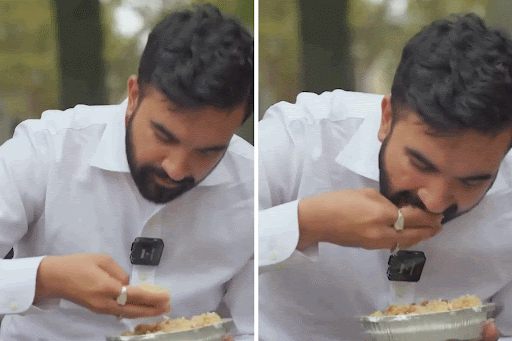One Bite, a Thousand Opinions: When Food Becomes a Political Statement

Imagine a politician making headlines—not for a fiery speech or a policy debate, but for how they eat their food. That’s exactly what happened when Zohran Kwame Mamdani, a 33-year-old New York City mayoral candidate, posted a video of himself eating rice with his hands.
For millions across South Asia, Africa, and the Middle East, eating with hands is a cultural norm, a way to connect with food on a sensory level. But in America’s hyper-polarized climate, this simple act became a political flashpoint, igniting debates about identity, assimilation, and who gets to define “American” values.
The Viral Moment That Divided America
The video wasn’t leaked—it was part of Mamdani’s campaign content, showcasing a casual meal with constituents. But when it reached far-right circles, the backlash was swift.
Texas Republican Rep. Brandon Gill reposted it with a caption that read:
“Civilised people in America don’t eat like this. If you refuse to adopt Western customs, go back to the Third World.”
The comment section exploded. Some agreed, calling the act “uncivilized.” Others fired back, pointing out the hypocrisy of policing cultural traditions in a nation built by immigrants.
Mamdani’s Response: “This Is Who I Am”
Mamdani, a Ugandan-born Indian-American and a democratic socialist, didn’t shy away from the controversy. In an interview with Bon Appétit, he explained:
“I have to eat with my hand. In Uganda, we even eat salad with our hands. Food isn’t just nutrition—it’s emotion, memory, and identity.”
He also addressed accusations of “performative activism,” clarifying that this wasn’t a political stunt—it was his everyday reality.
Why This Debate Goes Beyond a Plate of Rice
The backlash against Mamdani isn’t just about etiquette. It’s about:
- Cultural Gatekeeping – Who decides what’s “acceptable” in American public life?
- Assimilation Pressures – Must immigrants abandon their traditions to “fit in”?
- Racial Double Standards – Why are European customs (like eating pizza with hands) normalized, while non-Western practices are mocked?
“Roti & Roses”: A Campaign Built on Food & Justice
Mamdani’s slogan, “Roti and Roses,” reflects his belief that dignity comes from both survival and joy:
- Roti = Basic needs (food, housing, healthcare)
- Roses = Beauty, culture, and aspirations
He connects food insecurity to systemic inequality, arguing that how we eat—and who gets to eat well—is a political issue.
The Bigger Question: Can You Be Authentic and Still Belong?
This controversy forces us to ask:
- Is there only one “right” way to be American?
- Why do we police cultural expression in politics?
- Can America truly embrace diversity if even a meal becomes divisive?
Mamdani’s stance is clear: “Be authentic or go home.” And for him, authenticity means eating, living, and governing without apology.
Your Turn: What Do You Think?
Poll: Should politicians adapt to “Western” norms, or embrace their cultural traditions?
- “Assimilation is necessary for unity.”
- “Diversity should include everyday customs like food.”
- “This debate misses the real issues.”
Comment below: Have you ever faced judgment for how you eat? How should America navigate cultural differences in public life?
Sources: Verified interviews, campaign materials, and public statements.
Disclaimer: Views expressed are based on reported facts and do not reflect an editorial stance.
Why This Story Matters
This isn’t just about Zohran Mamdani—it’s about who gets to feel at home in America. In a country where food, language, and customs are constantly politicized, this moment forces us to confront: What does it really mean to belong?
Follow for more deep dives on culture, politics, and identity.
#CultureWar #ZohranMamdani #FoodPolitics #ImmigrantVoices #RotiAndRoses